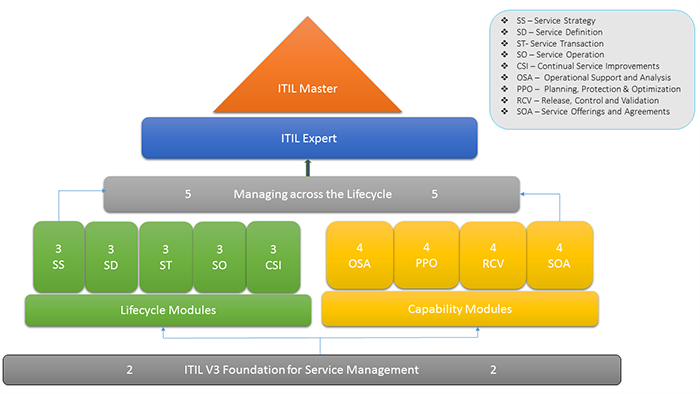Nbiz Training & Knowledge Transfer

IT Service Management Courses
Nowadays, the IT Service Industry is growing in leaps and bounds as well. There are outsourcing organizations, IT hubs or call centers, which predominantly creates a pure business model by providing IT training services/customer services.
At Nbiz, we instill the various aspects of IT Service Management such as the International Guideline (ITIL V3 Version).
Nbiz is accredited with AXELOS Provider via PeopleCert. We are authorized to offer the accredited courses and subsequently Nbiz is also an Exam Center for the same.
The various courses that are delivered in this group are:
ITIL V3 Foundation
This course teaches the first level of the IT Service Management. As per the AXELOS scheme the below is the structure of the various courses that needs to be taken to achieve the ITIL Expert or the ITIL Masters Level.

ITIL Expert Track
IT Expert Tract is a very popular offering in Nbiz. The above figure explains the IT Expert Track rationale on how to achieve an IT Expert qualification. The audiences/participants should acquire 22 credits on the first level to interact the whole ITIL Foundation current version is V3. The candidate will not be entitled to proceed on the next level until the other prior/preceding levels are cleared.
To summarize the above, the various players are as follows:
ITIL v3 Foundation ITIL Intermediate track MALC ITIL Expert ITIL Master
Note: The candidate should complete the ITIL v3 Foundation to be eligible for the ITIL Intermediate Track.
The ITIL Intermediate Track comprises of two different streams:
- Life-Cycle Modules or Life-Cycle Stream
- Capability Modules or Capability Stream
At Nbiz, we promote Capability Modules simply because the audiences/participants will be able to acquire more credits and lesser number of exams. The audiences/participants will be able to acquire skill set by completing each modules.
E.g. for better understanding:
OSA (Operational Support and Analysis) – Upon completion of the modules, the audiences/participants can become an OSA Analyst.
The Intermediate Track comprises of four modules namely: OSA, PPO, RCV and OSA. Upon completing the Intermediate Track, the audiences/participants has the opportunity to advance his level by attending MALC Course.
The difference between the Life-Cycle Modules and the Capability Modules:
Life-Cycle Modules focuses on:
- SS – Service Strategy
- SD – Service Design
- ST – Service Transition
- SO – Service Operation
- CSI – Continual Service Improvement
The Life-Cycle Modules are representing the five Life-Cycle stages of the IT Service Management while the Capability Modules are more focused on the creation of capability in each individual.
Capability Modules focuses on:
- OSA – Operational Support and Analysis
- PPO – Planning, Protection and Optimization
- RCV – Release, Control and Validation
- SOA – Service Offerings and Agreements
In either cases, the audiences/participants should complete the intermediate modules and pass the corresponding exams and then they will be entitled to take up the next step which is the ITIL MALC (Managing Across the Lifecycle).
MALC is the ultimate/concluding level which summarizes all the other modules learned at the intermediate levels and others, it is called Managing Across Lifecycle. Once the audiences/participants completes this course and pass the exam and completes the 22 credits, he/she will be entitled to be a certified ITIL V3 Expert.



 Special Offers
Special Offers
 GET OUR BEST DEALS!
GET OUR BEST DEALS!